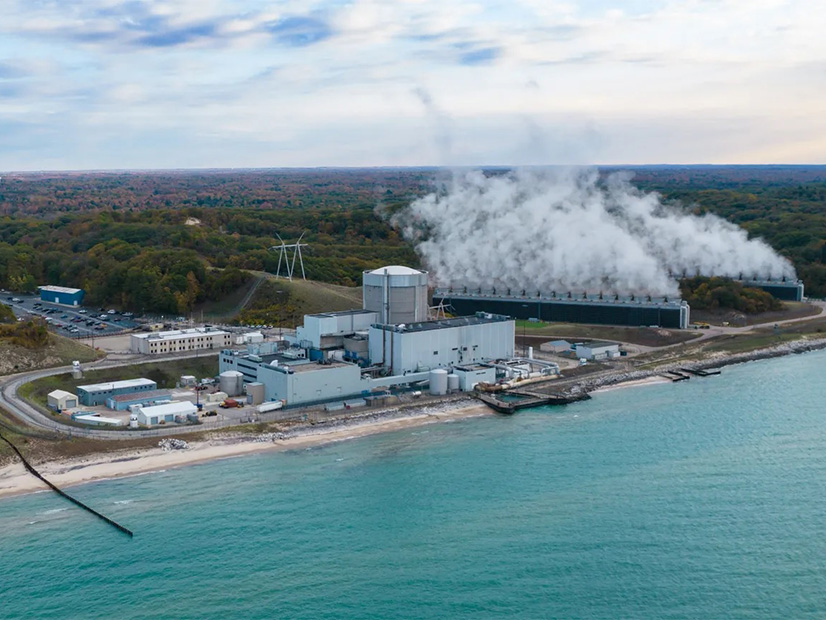Nearly 100 organizations and several hundred individuals have asked Michigan Gov. Gretchen Whitmer to abandon a strategy that would re-open the closed Palisades Nuclear Power Plant.
Led by the Beyond Nuclear campaign, the 94 groups and individuals sent a letter June 9 urging Whitmer to keep the nuclear plant shuttered. The plant was shut down in May, as promised in 2017 by Entergy (NYSE:ETR), its owner, and still has nine years remaining on its operating license.
Earlier this spring, Whitmer included Palisades for consideration in the Department of Energy’s $6 billion Civil Nuclear Credit (CNC) program to prevent nuclear generators’ early closure. The program originally had a mid-May deadline, but the DOE extended it to July 5. (See DOE Launches $6B Nuke Credit Program.)
“The bailout and restart scheme ignores Palisades’ severe, high-risk, age-related degradation, including multiple worsening pathways to catastrophic reactor core meltdown; the worst pressure vessel embrittlement in the country; severely degraded steam generators and reactor lid, exceedingly long overdue for replacement; a half-century worth of problem-plagued control rod drive mechanism seal failures, etc.,” Kevin Kamps, radioactive waste specialist at Beyond Nuclear, said in a press release.
Palisades’ reactor was removed from service in late May several days before Entergy’s official closure date. The utility said it was forced to shut the plant early because of performance issues with a control rod drive seal.
Entergy is in the process of selling the plant to Holtec International, which will dismantle the plant and remove spent fuel rods for long-term storage. The transaction is expected to take place next month and has already been approved by the U.S. Nuclear Regulatory Commission.
The closure coincides with a refueling deadline and the expiration of a 15-year power purchase agreement with Michigan utility Consumers Energy. Entergy has said it would entertain other potential buyers.
“Palisades produces more than 800 megawatts of reliable, clean, carbon-free power. Keeping Palisades open is a top priority,” Whitmer wrote in an April letter asking Palisades to be considered for the CNC program. “Doing so will allow us to make Michigan more competitive for economic development projects bringing billions in investment, protect hundreds of good-paying jobs for Michigan workers, and shore up Michigan’s clean energy supply and provide reliable lower energy costs for working families and small businesses.”
Whitmer said that over the last several years, Michigan’s government has worked to try to keep Palisades open “and voiced concern over the economic and energy impacts of losing the plant.” She said the Michigan Public Service Commission’s 2019 Statewide Energy Assessment showed that the plant strengthens reliability, helps temper commodity price risks, provides carbon-free energy, and offers fleet diversity.
Kamps called Palisades a “zombie reactor.” He said it’s not worth the risk to the public to resurrect the plant for another nine years of “ever more high-risk operations.”
He argued that it’s now time to secure the radioactive waste stored on-site and clean up contamination at the plant, which borders Lake Michigan.
“Our analysis indicates that Palisades does not even qualify for such a bailout under the U.S. Department of Energy’s own rules,” said Diane D’Arrigo, radioactive waste project director at Nuclear Information and Resource Service. “For starters, the governor is not allowed to apply. The owner must do so, but Entergy has made clear it is not interested. In fact, Entergy closed Palisades 11 days earlier than scheduled, to transfer the site to another company to dismantle and decommission.”
The CNC program allows owners of commercial nuclear reactors facing closure to competitively bid on credits to keep them in operation. Applicants must prove their reactor will close for economic reasons and that the closure will result in increased air pollution. Credits would be allocated over a four-year period.
The DOE does not comment on reactors’ eligibility for the program.




